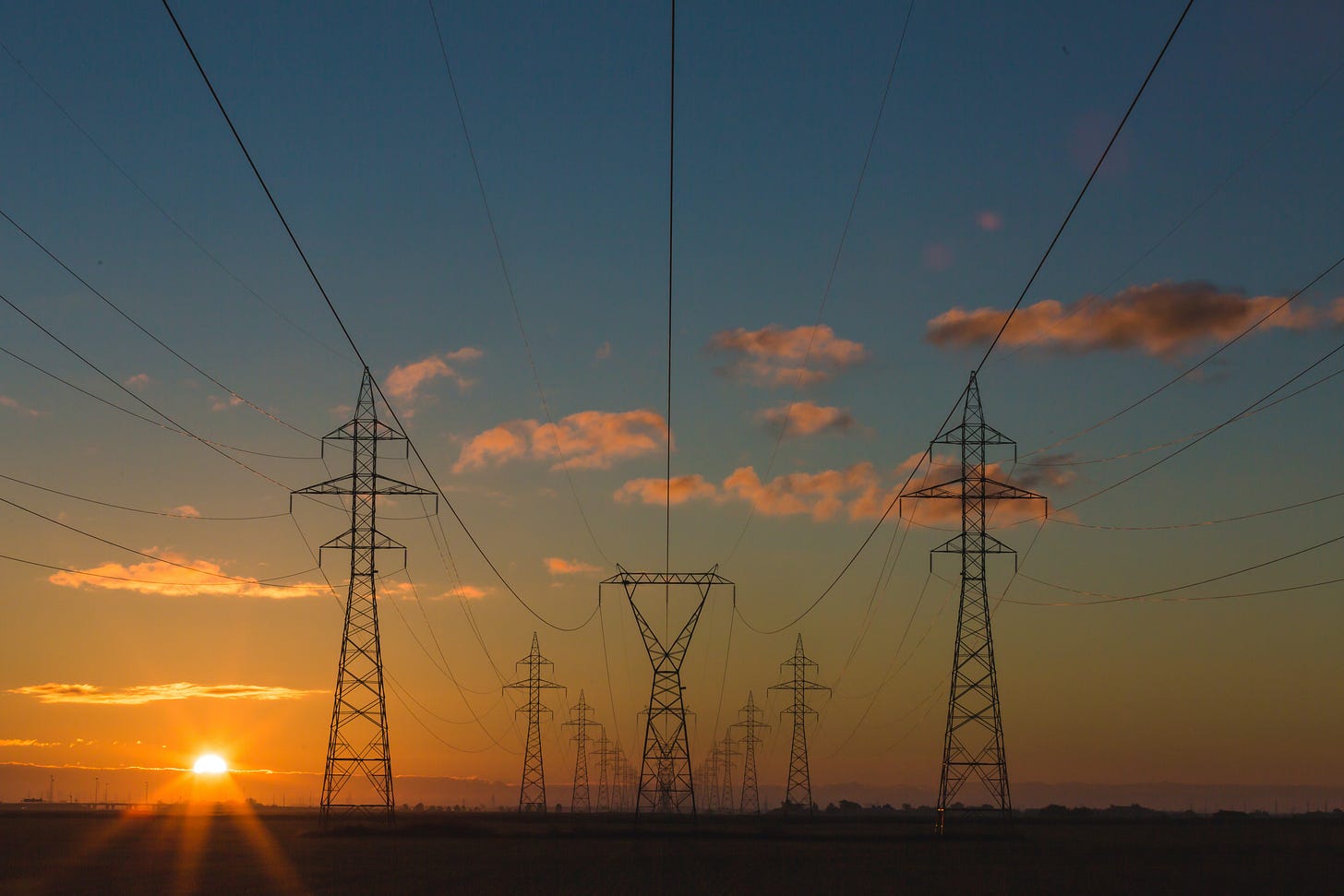Supercreator Daily: Progressives want to socialize your electricity
Plus: Twitter’s launches its new subscription service and a chic cooler to keep your cookout beverages ice-cold.
👋🏾 Hi, hey, hello!
While reporting yesterday on Amazon’s updated drug policy that will now only test for marijuana for positions regulated by the Department of Transportation, I asked the company if the policy was effective immediately and if an applicant who was disqualified from employment due to a failed drug test for marijuana could reapply under the updated policy. A spokesperson got back to me today and said yes to both questions, which I’m glad to hear.
Also: Yesterday I reached out to the tech companies behind the biggest apps — including Twitter, Snap, Facebook, Google, Apple, LinkedIn, Lyft, Uber and Clubhouse — for comment on if it tests employees for marijuana, plans to revisit its drug policies in the near future if so and supports the MORE Act. Pinterest was the only company to get back to me by press time. Last night, Microsoft declined to comment. I followed up with each of them today but didn’t receive a response.
Last but not least: Tomorrow is World Doughnut Day! Here’s how to score free donuts wherever you are.
Now onto today’s news:
Progressives want to socialize your electricity
Although Medicare For All isn’t the law of the land, the idea of universal health care itself is now anchored into our mainstream public discourse. And if a few progressive elected officials have their way, the same will soon be said for electricity.
Rep. Cori Bush of Missouri introduced a new 12-page resolution today with Rep. Jamaal Bowman of New York to establish “access to electricity as a human right and eradicate the reliance on monopolized, profit-driven utility corporations and providers and the flawed regulatory regime that has failed to regulate these utilities in the public interest.” Bush also called for public utilities after the Texas storm crisis in February.
The resolution is co-sponsored by several of the Democratic Party’s progressive flank, including Reps. Alexandria Ocasio-Cortez, Rashida Tlaib, Mondaire Jones, Ayanna Pressley, Ilhan Omar, Marie Newman, and Raúl Grijalva. Bush has also earned the support of the union representing workers at the Puerto Rico Electric Power Authority.
In an email to The New Republic’s Kate Aronoff, Bowman wrote: “Certain segments of our economy — like water, health care, and energy — are so absolutely essential to people’s lives that we cannot allow profit motives to dictate decision-making. And as long as energy is treated as a commodity like any other, poor people, workers, and communities of color will suffer.”
The emergency measures our government passed to help Americans make ends meet during the worst part of the pandemic were intended to meet the moment of a generational public health and economic crisis that’s still not over yet. But for us to make our economy work for everyone who’s not a corporate executive or shareholder, we’ve got to make sweeping institutional changes to the winners-take-all industries that disproportionately marginalize poor people, communities of color and indigenous populations.
America has more power outages than any other developed nation. In 2018, 31 percent of US households had trouble paying energy bills. And according to Walter Haase, general manager for the Navajo Tribal Utility Authority (NTUA), the multi-service utility that provides electric, water, wastewater, natural gas, and communications services for the Navajo Nation, around 15,000 families in the US — representing 60,000 people — don’t have electricity and have never been connected to the electric grid as of last year.
This is unlikely to move opponents of the Green New Deal or any meaningful action to address the climate crisis. Critics bemoan the cost of the investment, but inaction will prove to be far more expensive. And while a Green New Deal doesn't explicitly call for eliminating fossil fuel usage, it would hit the industry hard which would bode poorly for the Republican Party’s electoral prospects.
As with other progressive priorities, the race to public electricity is likely to be a marathon, not a sprint. But as TNR’s Aronoff wrote, Bush’s resolution is far more imaginative than most of the other uncreative climate proposals and challenges the myth that “providing electricity is something that can make people rich.” Here’s to a future where public-owned goods and a sustainable safety net are resources that those who need them most can rely on — even when we’re not in times of global crisis.
In The Know
Shoutout to Paxton Smith, valedictorian at Lake Highlands High School in Texas, who swapped her approved speech for one condemning a new restrictive abortion law the state’s governor recently signed. “I am terrified that if my contraceptives fail me, that if I’m raped, then my hopes and efforts and dreams for myself will no longer be relevant. I hope you can feel how gut-wrenching it is, how dehumanizing it is, to have the autonomy over your own body taken from you,” she said. If we’re honest, a woman’s right to choose is always up for debate. But decisions like Roe v. Wade have at least protected the right for women to have an abortion against those who weaponize religion, racism and patriarchy to oppress others. As I wrote a couple of weeks ago, we won’t know the decision from the Supreme Court on the clearest threat to Roe until next year. But in the meantime, we can show Paxton and all the activists and organizations on the frontlines of the reproductive-rights movement some major love.
Creator’s Notebook
Twitter announced today the launch of Twitter Blue, a subscription service that offers power users who are willing to pay a monthly fee exclusive access to a suite of premium features, including undoing tweets, viewing threads in “reader mode” and priority tech support. The service is only available to users in Canada and Australia and is rumored to cost $2.99 for American users once it’s available stateside. In an email to The Supercreator, a spokesperson said Twitter wanted to test Twitter Blue in smaller markets before launching big. “Various factors are taken into account but for this particular launch, we chose Australia [and] Canada because we are excited about the digital-savvy audiences there and giving them access to this first-ever product.” Watch this space for news on when Twitter Blue is available in the US.
The Supercreator Interview: Brittany B., founder of A Little Britt of Fun
For this week’s Supercreator Interview, I checked in with Brittany B., founder of the lifestyle blog A Little Britt of Fun. During our chat, Brittany shared her thoughts on managing her blog with a day job in higher education, the origin of her popular “On Being” series and how she balances keeping real with keeping it, well, fun. Here’s a snippet of our convo:
Honestly, I think my blog and Instagram work as a nice balance for people because I don’t worry about what people want. I’ve created a space that speaks to me. We are all multifaceted people and because of this we have the capacity to focus on important topics and dig into things that make us uncomfortable while also focusing on utterly nonsensical and fun things. I found that when I stopped worrying about how folks would perceive what I was doing I was able to better create content that people enjoyed and that felt balanced. I think the content is naturally balanced because it’s authentic to who I am as a person.
The full interview will be featured in this weekend’s issue of the Supercreator Select, a new exclusive bonus newsletter for premium subscribers to The Supercreator. The Select includes weekly interviews, my Ask Michael Q&A column and a breakdown of the stories I’ll be covering in the upcoming week so you can focus your attention on the news that matters to you and your creativity.
In addition to the Supercreator Select, premium subscribers enjoy:
Commenting privileges and invitations to members-only pop-up discussions
24/7 access to the full archive
A link to my private calendar to book Supercreator One-on-Ones, virtual office hours to discuss whatever’s on your mind and get face-to-face professional support
Subscriptions also enable The Supercreator to deliver an ad-free reading experience minus aggressive pop-ups, annoying auto-play videos or third-party sponsored content.
Subscribe to The Supercreator to get the Select sent straight to your inbox this Sunday. Already a subscriber? Log in at any time to manage your account.
Read All About It
Kate Julian at The Atlantic on America’s drinking problem:
Men still drink more than women, and of course no demographic group has a monopoly on either problem drinking or the stresses that can cause it. The shift in women’s drinking is particularly stark, but unhealthier forms of alcohol use appear to be proliferating in many groups. Even drinking in bars has become less social in recent years, or at least this was a common perception among about three dozen bartenders I surveyed while reporting this article. “I have a few regulars who play games on their phone,” one in San Francisco said, “and I have a standing order to just refill their beer when it’s empty. No eye contact or talking until they are ready to leave.” Striking up conversations with strangers has become almost taboo, many bartenders observed, especially among younger patrons. So why not just drink at home? Spending money to sit in a bar alone and not talk to anyone was, a bartender in Columbus, Ohio, said, an interesting case of “trying to avoid loneliness without actual togetherness.”
Alex Shephard at The New Republic on Joe Biden and “infrastructure week”:
What then, if Biden can secure neither the metaphoric nor the real-world victory? Here, the best possible consolation prize for the president is a shift in the way the media talks about the president. Should these well-hyped talks with Republicans fail, occluding a high-profile bipartisan achievement early in his term, it’s possible that—as my colleague Osita Nwanevu wrote last month—the media narrative might shift, rewarding Biden for his noble commitment to unity and civility, and holding a wayward GOP accountable for spurning his genuine advances. It’s a tough ask of a Beltway media that thrives on conflict and failure, and which often acribes the failure to bridge the intractable divide to the president’s inability to lead. It may be that infrastructure week is destined to remain a sort of cynical joke, only reinvented as a symbol of Biden’s failure to deliver the bipartisan promise his 2020 campaign sold to voters.
Sigal Samuel at Vox in conversation with Michael Tubbs on guaranteed income:
Sigal Samuel: When thinking about universal basic income versus guaranteed income, do you see one as more ideal than the other? In your mind, is the ultimate goal to end up with UBI as federal policy, but you’re just starting with guaranteed income because it’s easier to sell people on?
Michael Tubbs: My whole focus is I am committed to getting rid of poverty. Getting a guaranteed income is something that seems much more politically feasible in this moment, and it helps me achieve my objective.
I will say, though, that with automation and the way work will change, at some point this country will have to reckon with the idea of a universal basic income. UBI makes sense, and it’s going to make even more sense as we see automation [causing job] displacement. But guaranteed income makes a lot of sense today. I want to make sure we get to those who absolutely need it today and then we build to a point where we get it to everyone.
I think a guaranteed income puts us in a better position to implement a universal basic income.
Rani Molla at Recode on the digital divide:
The crux of the issue is that the US is very large and building out internet infrastructure is expensive, so internet companies are more likely to do so in areas where there are lots of paying customers: wealthier and populous areas. Since internet companies are not regulated like utilities, they have little economic incentive to build out internet to isolated or poorer areas, where there are fewer customers or at least fewer customers who can afford it. The result is a digital divide in which many poorer and more rural Americans lack access to broadband internet.
Becca Andrews at Mother Jones on the stigma of “late-term abortions”:
Data from the Guttmacher Institute, a think tank that researches reproductive health care, confirms that pregnant people who get abortion care past the first trimester are often doing so because there were barriers that took time to overcome. A 2004 survey showed that 58 percent of abortion patients would have preferred to get care earlier in pregnancy. A 2014 analysis showed that “women with less education, black women and women who had experienced multiple disruptive life events (such as unemployment or separation from a partner) in the past year were more likely than others to have had an abortion at or beyond 13 weeks’ gestation,” and that distance from abortion providers—which are increasingly far for more and more people—as well as waiting periods, another growing phenomenon, are also significant factors that delay care. The authors of the Turnaway Study, a 10-year study which was published by the University of California, San Francisco, and examines the lasting effects on people who are turned away from abortion care, estimate that more than 4,000 women are denied abortion care annually due to gestational limits, and thousands more will be affected as these laws continue to proliferate in state legislatures.
Rachel Sugar at Grub Street in praise of small menus:
The best way to experience a restaurant, I have always felt, is by eating exactly what it wants to feed you. I do not want choices. I want the best thing. A restaurant might have five or ten best things, but it cannot have 45. There are many infuriating things about the world, but one of the more fixable is the sensation of acute regret from having ordered wrong. Why are there possibly wrong orders? Recently, I was at a fancy restaurant with great pastas and bad pizzas. So cut the pizzas! A kitchen that focuses on its strengths turns out consistently excellent things, even if that results in fewer total things. (The exceptions to this are 24-hour diners with phone-book menus; some institutions are worth preserving.)
Michael’s Pick
Business & Pleasure Co. Premium ‘70s Panel Cinque Cooler Bag ($79): We’ve arrived at the pre-summer phase where I imagine showing up to all the kickbacks — that I’ll ultimately be too people-averse to attend — with a cooler of ice-cold bevvies to survive the city’s obnoxious heat.
Thanks for reading! I appreciate you for sharing part of your day with The Supercreator. See you on Monday. — Michael





